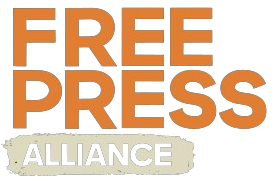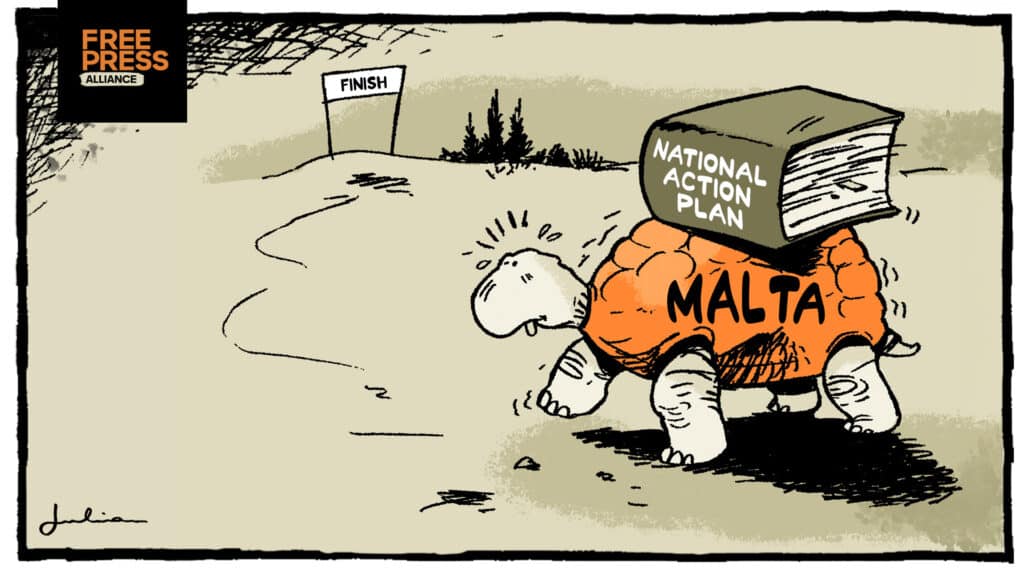On October 16, 2017, investigative journalist Daphne Caruana Galizia was killed in a car bomb attack outside her home in Bidnija. Her assassination shocked Europe and exposed the fragility of press freedom in Malta.
For many Maltese journalists, Daphne’s death was not only a tragedy but a turning point, one that opened a window to demand protection, accountability, and structural reform to guarantee the safety of the independent press.
Eight years later, her name continues to inspire calls to accountability. Now, international press freedom groups are urging Malta to take that next step: to adopt a National Action Plan on Media Freedom and Journalist Safety. This proposal, put forward by 18 organizations, including the International Press Institute (IPI), Reporters Without Borders (RSF), and the International Federation of Journalists (IFJ), aims to translate years of consultation into concrete policy.
Media Landscape
Malta’s media environment is small and highly concentrated. The Public Broadcasting Service (PBS) is the main public broadcaster, while political parties directly own or control several other outlets, a structure that blurs the line between journalism and politics.
Independent voices such as the Times of Malta, Malta Independent, and Malta Today, alongside several online news portals and investigative blogs. Yet, these organizations often face political pressure, limited funding, and harassment.
State advertising is frequently a key tool of influence; with limited media outlets, government advertising budgets are used to reward friendly coverage and punish criticism. Meanwhile, journalists who challenge the authorities often become targets of smear campaigns or intimidation, sometimes directly from politicians who use their own channels or social media to attack reporters publicly.
Access to government information is also restrictive. Journalists must obtain a government-issued press card to attend official events or press conferences, giving authorities undue discretion over who qualifies as a journalist.
Legal framework: protections on paper, gaps in practice
While press freedom is enshrined in Malta’s constitution, legal and regulatory frameworks fail to fully protect journalists in practice.
Access to public information remains limited, while defamation lawsuits and Strategic Lawsuits Against Public Participation (SLAPPs) continue to be used to silence investigative reporting.
No independent oversight body exists to oversee media ownership, state advertising, or political interference.
The European Media Freedom Act (EMFA) and new EU anti-SLAPP directives are expected to strengthen journalists’ rights, but local implementation will be decisive. Civil society organizations have repeatedly called for constitutional and legislative reform that recognizes independent journalism as a cornerstone of democracy.
National plan for press freedom: key demands
The coalition of press freedom groups has laid out a roadmap urging Malta to adopt a comprehensive National Action Plan, with the following priorities:
- Establish a national action plan on media freedom and journalist safety
Create a strategic framework with measurable benchmarks, political backing, and leadership trusted by the journalist community. - Build an institutional response structure
Set up a cross-institutional body to coordinate responses to threats against journalists, ensuring accountability and rapid-response mechanisms. - Undertake constitutional reform
Recognize journalism as one of the pillars of democracy and enshrine the right to access information held by the state. - Foster an enabling environment for journalists
Condemn public attacks against reporters, train law enforcement and judicial officers, and ensure journalists have access to protection orders for threatened reporters. - Support female journalists
Monitor and prioritize measures to protect female journalists against all forms of psychological pressure, including online harassment and gender-based threats, following OSCE and EU guidelines. - End vexatious lawsuits, including SLAPPs
Reform the Media and Defamation Act, extend judicial protections, and implement both EU and Council of Europe anti-SLAPP recommendations. - Strengthen access to information
Improve transparency and efficiency in FOI processes, and reform the Freedom of Information Act. Such improvements should be user-friendly, efficient, and embedded in a culture of accountability and openness. - Implement the Daphne Caruana Galizia public inquiry recommendations
Address structural corruption and impunity through reforms in criminal law, administrative practices, and ethical breaches across institutions. - Safeguard independent self-regulation
Ensure regulatory reforms are not misused for state interference; strengthen self-regulation based on European press-council standards. - Protect source confidentiality
Develop protocols ensuring law-enforcement bodies cannot compel journalists to reveal sources; strengthen whistleblower protection. - Guarantee independent public service media
Reform PBS to ensure editorial independence, transparent appointments, and sustainable multi-year funding. - Ensure transparency in state advertising
Create an independent body and public registry to monitor state advertising spending, preventing political favoritism. - Increase transparency of media ownership
Establish a national, public, online database detailing direct and beneficial ownership of all media outlets. - Prevent market concentration
Introduce thresholds and oversight mechanisms to safeguard media pluralism and stop excessive cross-ownership.
Obstacles to implementation
Despite these clear recommendations, progress has been painfully slow. Government consultations have not yet resulted in a tangible plan. Political interference and media ownership concentration continue to limit the diversity of opinion.
Journalists continue to face harassment, online abuse, and economic precarity, especially women and investigative reporters. Without institutional reform and protection mechanisms, impunity remains the norm.
Why it matters
Malta’s reform process carries regional significance beyond its borders. As one of the EU’s smallest member states, it is often seen as a test case for how democracies uphold press freedom.
Adopting and implementing the National Action Plan would signal Malta’s commitment to the principles of Daphne Caruana Galizia stood for: transparency, accountability, and journalism integrity.
Conclusion
Eight years after Daphne’s murder, Malta stands at a crossroads. Civil society has done its part, submitting a comprehensive, detailed plan that aligns with international law and democratic values.
The next step lies with Malta’s leaders: to turn consultation into commitment, and commitment into action.
If implemented, the National Action Plan could transform Malta’s media landscape, from one marked by control and impunity into a genuine model of press freedom in Europe.

